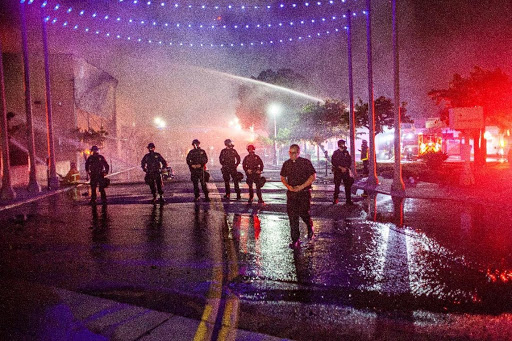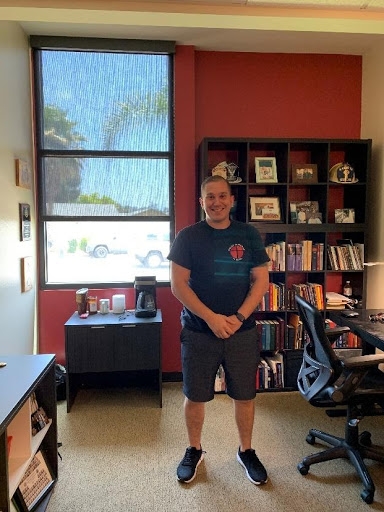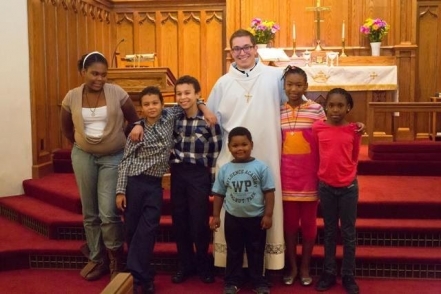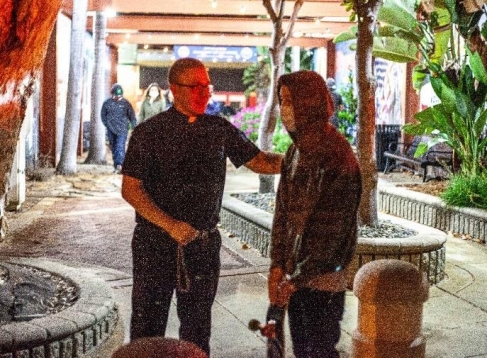
Hear our interview with Pastor Travis Ferguson, aired on KNSJ radio, by clicking the audio link.
By Briana Gomez
Photo by Jake Rose: Pastor Ferguson in La Mesa, as police guard street while firefighters battle flames at the Randall Lamb Building
June 23, 2020 (La Mesa) -- After being sighted praying amid the La Mesa riots the night of May 30th, Pastor Travis Ferguson has found himself in unexpected limelight as a symbol of hope for La Mesa.
Military reserve chaplain finds strength in diversity
At first glance, Pastor Ferguson, a former chaplain, could be any of the mild-mannered, well-spoken military men who end up in San Diego.

Wearing athletic attire and sporting a high and dry hair cut, Pastor Ferguson sits at his office desk in Christ Lutheran Church, La Mesa. His short-sleeve shirt shows arm tattoos, particularly the large Hebrew letters which spell out “Ahava.” Loosely translated, this means steadfast love, a Hebrew version of agape.
Photo, right: Pastor Ferguson in his office at Christ Lutheran Church, La Mesa
Pastor Ferguson says the message is on his right arm because that is the arm he’s quick to chastise with, as well as the arm with which he serves communion to his parishioners.
Ferguson has been an Air Force Reservist since 2014, which has led him to work with a diverse group of individuals.
“I love it. The Chaplain Corps is very diverse,” Ferguson says, in an exclusive interview with ECM. He says that the last course he participated in “had five females and three of them were people of color. Out of our class of 20, nine were people of color.”
The Lutheran church is a liturgical faith based on reformed Catholicism. While most Lutherans in the United States are Caucasian, Ferguson notes that the largest group of Lutherans is actually on the African continent, citing over 9 million Lutherans in Ethiopia alone.
Here in La Mesa, Ferguson serves some immigrants hailing from Africa, who have come to him to express their emotions during this particularly emotional time for blacks in the United States – not that history has ever provided a time of calmness for minorities. Although discrimination is not something they’ve suffered in the church, according to Pastor Ferguson, it has been a part of their individual experiences.
Christ Lutheran, where Ferguson works as Pastor of Family Connections, also boasts an elementary school which has a diverse student body reflective of the San Diego community, he says.
Overcoming adversity
The photos that surfaced of a man in a priestly uniform genuflecting in front of Vons and praying before a line of police officers as buildings burn in the background showed a stringent juxtaposition between the pastor and the chaotic scene around him.
However, Pastor Ferguson is no stranger to tough times on the streets--or to riots.
His father was a drug dealer in Missouri and his mother struggled at times to support the family.
“I come from a broken home. My parents divorced when I was two; I was raised by a single mom who worked four or five jobs to support us,” said Ferguson.
When asked why he was able to overcome such adversity, while others are stuck in a social system that may seem rigged against them, Ferguson replied, “I struggled with this, even after serving in the black community because people would still talk about white privilege; it’s not a new term. I always thought, like, I’m sure there are those out there who had white privilege but it wasn’t me, until a couple weeks ago when I realized somebody had posted an article on Facebook and it said, ‘white privilege does not mean that your life wasn’t hard, it doesn’t mean that you haven’t faced challenges, it means that the color of your skin never went against you in those’ and that really hit me hard.”
The pastor added, “Having served in St. Louis, having served in minority communities, I looked at some of the family structures and thought, ‘Is it possible for people to get out of that? One hundred percent. Are the odds stacked in their favor? No.”
Ferguson thus attributes some of his success to being white in the United States, and not having his skin color act against him on top of the other adversity he faced.
He also believes that the systemic policies that were originally designed to affect the black community are also contributing to the inability of some minorities to leave impoverished areas. He doesn’t feel that such policies are intentionally being perpetrated that way now, but that the era of segregation was all too recent.
“There are still people around today who drank from a black-only water fountain,” Ferguson notes, putting the systemic structure of racism in perspective.
“For some reason this has become a political issue, I don’t understand why. Appreciating someone’s color should not be a political issue, and then you think about if housing costs and taxes influence local schools…that’s a crock of shit,” says Ferguson, who believes that elementary through high school education is fundamental right.
“Why on earth are taxes being unevenly distributed that way…I could be ignorant in this thought but I don’t think that’s the intention now, I think that was the intention 60 years ago when we had segregated schools,” adds Ferguson, “…it’s odd when you set people up for failure in that way…You set people up by not having teachers that are paid a fair amount.. That’s wrong.”
Ferguson was born into the Baptist faith but grew up attending Catholic and Lutheran churches. After graduating from high school, he moved to Nebraska for college, where he graduated with a Bachelor of Arts in Psychology and Behavioral Sciences before returning to Missouri to attend Concordia Seminary, graduating with a Master of Divinity.
Split between two liturgical faiths, Ferguson originally wanted to be a Catholic priest but then he met his wife. who he says ruined his plans of celibacy.
“We still consider ourselves Catholic, just not Roman Catholic,” said Ferguson of their Lutheran faith.
In Ferguson, Missouri, pastor served community and police
In 2014, Pastor Ferguson became a Police Chaplain for the St. Louis Metro Police Department. He served there 12 hours per week and simultaneously served at a church in a neighborhood in North St. Louis which was predominately African American, as Ferguson described it.
 Photo, right, courtesy of Pastor Ferguson: Pastor Ferguson with congregation members in North St. Louis, Missouri
Photo, right, courtesy of Pastor Ferguson: Pastor Ferguson with congregation members in North St. Louis, Missouri
“I was the odd man out,” he recalls. But after assisting with the aftermath of some drive-by shootings, Ferguson earned his place in the community.
 “In some ways I feel like that’s what we need to choose a different option in life, is the presence of God,” Ferguson observes.
“In some ways I feel like that’s what we need to choose a different option in life, is the presence of God,” Ferguson observes. As for the dramatic image of himself in front of the police line in La Mesa (top of story) with buildings burning in the background in the early hours of May 31, Pastor Ferguson recalls, “My mind was drawn back to a similar police line in Ferguson, MO. I approached several police lines and asked if I could pray for them. My prayers focused around peace and protection.”
When asked his thoughts about what may have transpired after 4 p.m. (when journalists on scene and a police timeline based on dispatch communications confirm that protesters started being tear-gassed after rocks were thrown at police), Ferguson remains skeptical.
“Peaceful protesters have a right to peacefully protest, based off what I know from most police departments, they don’t use those types of means if there’s not a threat of violence,” he says. “But again. I don’t know.”
“You look at it as a downward spiral in so many ways,” Pastor Ferguson continues, referring to the La Mesa protest and later turn of events. “It was very unfortunate and I think everyone from the police department and Black Lives Matter, those who want to promote racial justice, would say that what happened on the night of May 30 here and what happened downtown with businesses being looted…that’s not what anyone wanted, that’s not what’s going to bring any sort of justice or unity.”
He adds, “I think what we need to be able to do as a society that we’re not good at is to forgive.” Then he asks rhetorically, “We’ve identified the problem; what’s the way forward now?”
Spiritual healing
From a spiritual perspective, many wonder how society will heal from the lengthy histories of racial tensions and oppression.
“As a Christian, and I think Muslims and Jews would all agree with this statement, it’s that we’re all created in the image of God,” the pastor who has mentored communities during civil unrest concludes. “If everyone’s created in the image of God, then that means I need to be able to treat everyone like I treat God.”
 Briana Gomez holds an MBA from the University of La Verne and a Bachelor of Science in International Business from Azusa Pacific University. A freelance journalist, she is originally from La Mesa and lived in Japan for five years in her youth. She later took an interest in travelling and learning about global cultures and cultural identities She taught English in Hungary in 2013 before obtaining her master’s degree, then returning to the U.S. to pursue journalism and research multicultural communication.
Briana Gomez holds an MBA from the University of La Verne and a Bachelor of Science in International Business from Azusa Pacific University. A freelance journalist, she is originally from La Mesa and lived in Japan for five years in her youth. She later took an interest in travelling and learning about global cultures and cultural identities She taught English in Hungary in 2013 before obtaining her master’s degree, then returning to the U.S. to pursue journalism and research multicultural communication.
Gomez has written for online and local publications in Budapest and in her native San Diego, including coverage in East County Magazine on multicultural communities. She is passionate about human rights and minority issues, bringing awareness to ethnic groups in our region. She also sits on the committee for the Arab and Muslim Community Coalition and is an active member of the San Diego Arab-American Anti-Discrimination Committee and San Diego House of Lebanon.
East County Magazine gratefully thanks the Facebook Journalism Project for support through its COVID-19 Local News Relief Fund Grant Program to help make this reporting possible. #FacebookJournalismProject.
You can donate to support our local journalism efforts during the pandemic at https://www.EastCountyMedia.org/donate.







Recent comments